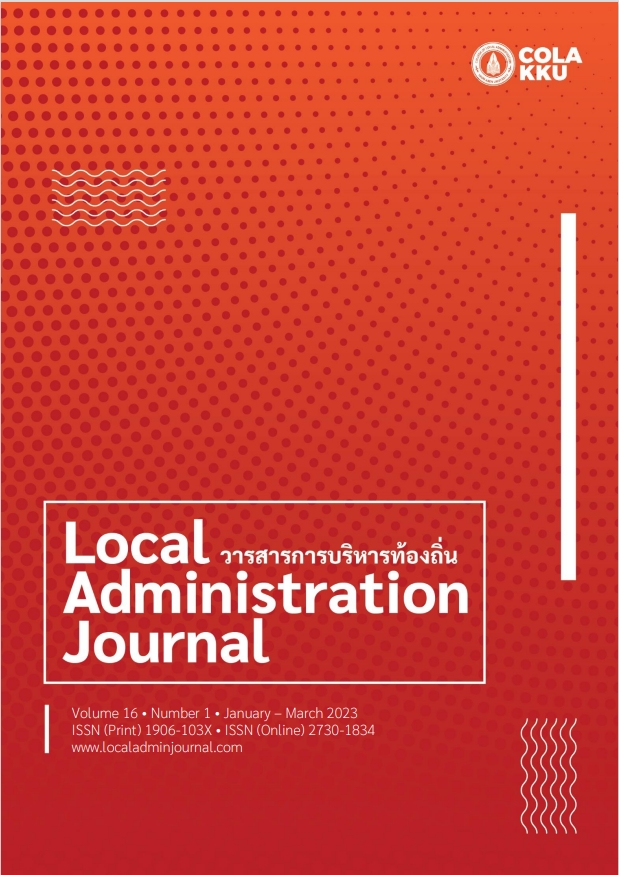A Behavioral Approach to the Collection of Overdue Motor Vehicle Tax
DOI:
https://doi.org/10.1234/laj.v15i1.253211Keywords:
Overdue tax collection, Behavioral approach, Motor Vehicle taxes, Experimental researchAbstract
This research employs a behavioral approach to studying the collection of overdue motor vehicle tax. The amount of unpaid taxes was worth 6.2 billion Thai baht in June 2019. This represents huge opportunity losses for local governments and brings about tax inequality between those who pay taxes and those who do not. Data from five sub-districts in Krabi Province was the focal point in this study. A nudge approach was applied to the five types of overdue tax-reminder letters. Overall, the nudge letters helped increase the tax payment rate by about 10.48%. Yet, the benefit-based nudge letter and the social norm message caused the higher rates than the base figure by 12.67 percent to 13.07 percent, respectively. The findings suggest that the behavioral approach is an intriguing alternative for the enhancement of local revenues and the related tax authority should pay closer attention to the collection of overdue motor vehicle tax. This may result in increased tax revenues for wider local public services and more equitable tax administration practices.
References
ภาษาไทย
กรมการขนส่งทางบก. (2562). กลุ่มสถิติการขนส่ง. สืบค้นจาก https://web.dlt.go.th/statistics/
ภาษาอังกฤษ
Battaglio, R. P., and Benardinelli, P. (2018). Behavioral public administration ad fontes: A synthesis of research on bounded rationality, cognitive biases, and nudging in public organizations. Public Administration Review, 79(3), 304-320.
Behavioural Insights Team. (2012). Applying behavioural insights to reduce fraud, error, and debt. Retrieved from https://www.gov.uk/government/publications/fraud-error-and-debt-behavioural-insights-team-paper
Behavioural Insights Team. (2014). EAST: Four simple ways to apply behavioural insights. Retrieved from https://www.bi.team/wp-content/uploads/2015/07/BIT-Publication-EAST_FA_WEB.pdf
Behavioural Insights Team. (2016). The behavioural insights team’s update report 2015-16. Retrieved from http://www.behaviouralinsights.co.uk/publications/the-behavioural-insights-teams-update-report-2015-16
Bott, K., Cappelen, M., Alexander, W., Sørensen E. Ø, and Tungodden, B. (2020). You’ve got mail: A randomized field experiment on tax evasion. Management Science, 66(7), 2801 – 2819.
Buchanan, J. M. (1987). Public finance in democratic process: Fiscal institutions and individual choice. Chapel Hill, NC: University of North Carolina Press.
Buchanan, J. M., and Musgrave, R. A. (1999). Public finance and public choice: Two contrasting visions of the state. Cambridge, M.A.: MIT Press.
Dunning, T. (2012). Natural experiments in the social sciences: A design-based approach. Cambridge, UK: Cambridge University Press.
Hallsworth, M. (2014). The use of field experiments to increase tax compliance. Oxford Review of Economic Policy, 30(4), 658-679.
Hallsworth, M., List, J. A., Metcalfe, R. D., & Vlaev, I. (2014). The behaviouralist as a tax collector: Using natural field experiments to enhance tax compliance. NBER Working Paper# 20007, Retrieved from http://www.nber.org/papers/w20007
Hanifan, L. J. (1916). The rural school community centre. The Annals of the American Academy of Political and Social Science, 67(1), 130-138.
Haynes, L. C., Green, D. P., Gallagher, R., John, P., and Torgerson, D. J. (2013). Collection of delinquent fines: An adaptive randomized trial to assess the effectiveness of text messages. Journal of Policy Analysis and Management, 32(4), 718-730.
John, P., Smith, G., and Stoker, G. (2009). Nudge nudge, think think: Two strategies for changing civic behavior. The Political Quarterly. 80(3), 361 – 370.
Putnam, R. D. (2000). Bowling alone: The collapse and revival of American community. New York: Simon & Schuster.
Shadish, W. R., Cook, T. D., and Campbell, D. T. (2002). Experimental and quasi-experimental designs for generalized causal inference. Boston, MA: Houghton.
Thaler, R. H., and Sunstein, C. R. (2008). Nudge: Improving decisions about health, wealth, and happiness. London: Penguin Books.
Translated References
Department of Land Transport. (2019). Transport Statistics Group. Retrieved from https://web.dlt.go.th/statistics/ (in Thai)
Downloads
Published
How to Cite
Issue
Section
License
Copyright (c) 2022 Local Administration Journal

This work is licensed under a Creative Commons Attribution-NonCommercial-NoDerivatives 4.0 International License.
The copyright of all articles published in the Local Administration Journalis owned by the College of Local Administration, Khon Kaen University.



